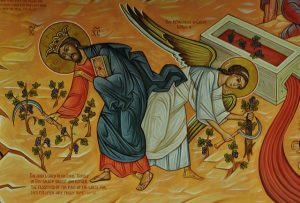Revised Common Lectionary reflection for the Eighteenth Sunday after Pentecost, Year A, Proper 22
October 8, 2017
Lessons: Isaiah 5:1-7, Psalm 80:7-15, Philippians 3:4b-14, Matthew 21:33-46
Theme: God’s faithful and generous people work to cultivate a faithful and abundant harvest—the fruits of grace and gratitude.
Key Scripture: Therefore I tell you, the kingdom of God will be taken away from you and given to a people that produces the fruits of the kingdom. Matthew 21:43
Preaching/Teaching Reflection
At one point or another in their academic career most students have encountered John Steinbeck’s Pulitzer Prize-winning novel The Grapes of Wrath. The Joad family, having lost virtually  everything of value to the bank and natural disaster, is forced to migrate from their home in Oklahoma to California in search of a better life. Throughout the course of the novel, one is exposed through this fictional family to the very real realities of economic injustice and the ravages of poverty.
everything of value to the bank and natural disaster, is forced to migrate from their home in Oklahoma to California in search of a better life. Throughout the course of the novel, one is exposed through this fictional family to the very real realities of economic injustice and the ravages of poverty.
In this week’s gospel lesson we have a story of a landowner, a vineyard, some tenant workers, and the various representatives who come to collect the grapes. It is a difficult story to hear and to understand; a lot of how one experiences Jesus’ words depends on how one perceives the characters and to whom one relates.
Are we the rightful collectors of holy benefits? Are we greedy and selfish tenants who refuse to pay their due to the vineyard owner? Or, do we see ourselves as overworked and underpaid workers who rightfully revolt against an unjust system of oppression? Are we righteous or rotten–or a little of both? Who are we?
Jesus is making a point with the Pharisees, good religious folk of his day, who are trying to entrap him and put a stop to his radically different message and ministry. Be careful where you’re pointing your finger, he seems to be saying, because there are a few more fingers pointing right back at you. Oh how frustrated they seem to be, afraid to press the point because of the throngs of followers who are hanging on Jesus’ words.
In exploring possible ways to approach this gospel lesson, what might it look like to contrast the worldy view of “grapes of wrath” (yes, a biblical reference to Revelation 14:19-20) with a new vision of grapes of grace? With Jesus everything is turned upside down and inside out, so it isn’t really that much of a stretch when you think about it. That which God produces is always life-giving, grace-filled, and hopeful. It is fallen humankind that takes the fruit of God’s good creation and extracts a wrathful harvest of injustice and oppression.
What at first glance seems so straightforward and righteous about this parable turns quickly on the words of verse 43 (above). The kingdom of God will be taken away from the obvious beneficiaries and given to those who produce the fruits of the kingdom. It’s easy to gloss over this verse by thinking these people are those who do good, who follow the rules, play the game right, and keep up proper appearances. But what if those who produce the fruits are those on the margins, those who bear the brunt of heavy labor, those who strain at the yoke of injustice, and those who suffer for our choices? What happens, as Langston Hughes writes in his poem “Harlem,” to a dream deferred? Does it indeed explode?
 A stewardship question worth asking is just how are we tending the fruits of God’s garden? Are we working together–tenant/grower and representative of the landowner–to produce the best possible yield? Are we cultivating sweet grapes of grace or extracting all that we can without thought for others in a harvest of wrathful choices and selfish gain? Are we sowing gratitude at every opportunity?
A stewardship question worth asking is just how are we tending the fruits of God’s garden? Are we working together–tenant/grower and representative of the landowner–to produce the best possible yield? Are we cultivating sweet grapes of grace or extracting all that we can without thought for others in a harvest of wrathful choices and selfish gain? Are we sowing gratitude at every opportunity?
As with most of Jesus’ teachings there are clear answers, but rarely ones that go down easily and without some effort. The parable of the vineyard is no exception, challenging us to think outside of the boxes of comfortable assumptions and cultural norms. Yes, we are asked to see this story through cross shaped lenses, framed against the cornerstone of grace, and we are challenged to do something in response. What will that be? What is our grateful and grace-full response?
In Worship
We are fed by Christ; this is true. In body and blood, bread and wine, we receive the living Lord. Consider singing “By Your Hand You Feed Your People” (Evangelical Lutheran Worship #469). You can find Marty Haugen’s hymn here on You Tube.
With Youth
Why not consider Paul’s words from Philippians 3:4b-14. Paul had all the right credentials, the cool connections, and the proper pedigree. Once Christ encountered him, however, he gave up everything that had held meaning for him and turned his eyes toward Jesus. Instead of Mr. Cool, Paul became a holy fool in the eyes of the world. He turned from striving for power and prestige to pressing on toward the prize of eternal life. His faith has set him free to chart a different course, to follow Christ at all costs.
What might it mean for teens today to “…press on toward the goal for the prize of the heavenly call of God in Christ Jesus”? What are the challenges? What are the rewards? How and where do they find strength to press on?
With Children
Bring some grapes to share with the children as a snack. Ask them if they know much about how grapes are grown. If you have someone in your congregation who grows grapes, invite that person to talk about how to tend a grape vine so that it will produce. If grape vines are not properly tended, they will fail to produce well. Just so, disciples who do not tend to the development of their faith may dry up and fail to produce good fruit. There are several good YouTube videos about tending grapes. Here’s one about “leaf pulling.” Growing good grapes requires effort and careful management. Invite the children to think of ways we cultivate disciples (prayer, studying scripture, worship, involvement in the faith community, cultivating generosity and the desire to serve). Give each child a coloring sheet with grape vines on it and add the final two verses of this week’s psalm (80:7-15): “Turn again, O God of hosts, look down from heaven, and see; have regard for this vine, the stock that your right hand planted.
Weekly Stewardship Bulletin Insert
This week’s gospel lesson is tough, and it might be easy for us to gloss over any application to our lives today. Still, the question persists: How are we tending God’s vineyard? Are we cultivating the grapes of grace and abundance, or are we headed toward a harvest of wrathful choices and selfish gain?
Stewardship at Home
Tending vineyards is difficult and time-consuming work that requires careful stewardship and precise cultivation. Tending to our faith formation and discipleship also requires our full attention and effort. Why not aim for a visual this week? Find a door or wall where you can post a drawing of a grape vine. Cut out some green grape leaves and purple grapes. As the week progresses, add green leaves for each act of faith formation in which you participate (reading scripture, praying, attending worship or a committee meeting—anything you do within the body of Christ to strengthen your faith life). Add grapes for every discipleship action in which you participate or action you notice (giving, serving, considering others, participating in advocacy—anything where your faith has yielded fruit). Alternatively, make a butcher-paper runner for your table and draw the vine and grapes at meals. You might also simply choose to write and/or draw in a journal. The aim of this exercise is to take note of the kind of fruits you are cultivating. Pray for a faithful and fruitful response.
Photos: Julianna, Tom Pratt, and Ted. Creative Commons. Thanks!




Leave a Reply